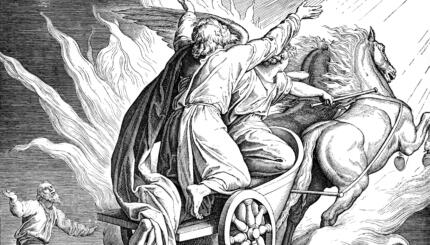Commentary on Parashat Nitzavim, Deuteronomy 29:9 - 30:20
In 1991, the country music star Aaron Tippin topped the charts with a song about a man who grows up poorer but much wiser because of the decisions of his father:
He’d say you’ve got to stand for something or you’ll fall for anything,
You’ve got to be your own man not a puppet on a string.
This week’s portion, Nitzavim, begins with the words: “Atem nitzavim hayom kulchem lifnei Eloheichem”–You stand today before Adonai Your God. The Israelites are standing on the border of Israel, preparing to enter the Land and create their own nation. The Hebrew word used here for “standing” is nitzavim, which is significant because of its rarity in the Bible. The more common biblical word for standing is omdim, from the verb omeid. Both words indicate standing of some kind, but the use of nitzavim is unusual and thus noteworthy.
Nitzavim and Omdim
There are two biblical episodes in which both words appear. In our Torah portion for example, the word omeid is used shortly after the verse cited above when the Israelites stand to accept God’s covenant: “I make this covenant not with you alone but both with those who are standing here with us this day before Adonai your God and with those who are not with us this day” (Deuteronomy 29:13-14). In this instance, omeid indicates standing to receive–the Israelites are waiting to accept the covenant. This passive standing differs from the imminent action implied in the nitzavim verse cited above, in which the Israelites appear coiled to launch themselves across the border.
Another example of these two words being used in the same episode occurs in Parashat Lech-Lecha. As Abraham sits at the entrance of his tent, three visitors are nitzavim alav–standing near him (Genesis 18:2). These are the visitors who foretell of Sarah conceiving a son. They had come to Abraham’s tent with a purpose. When Abraham stands by and watches the three visitors eat, the word used is omeid (Genesis 18:8). Again, omeid seems to indicate some passivity while nitzavim indicates action and purpose.

Help us keep Jewish knowledge accessible to millions of people around the world.
Your donation to My Jewish Learning fuels endless journeys of Jewish discovery. With your help, My Jewish Learning can continue to provide nonstop opportunities for learning, connection and growth.
Rabbi Miriam Carey Berkowitz furthers this distinction when she compares the phrase “atem nitzavim” of our portion with “vateitatzav,” which appears in reference to young Miriam standing on the shores of the Nile watching her brother float in a basket (Exodus 2:4). Berkowitz notes that vatetatzav and nitzavim share the letter-root y-tz-v, signifying that Miriam and the Israelites were both “firmly planted, unshakeable, committed.”
What Do We Stand For?
This week’s portion begins with the words: “Atem nitzavim hayom kulchem lifnei Adonai Eloheichem”–You stand today before Adonai Your God. This verse, particularly at this time of year, places us at the same point. We are standing nitzavim-style. What is it that we stand for unshakably and with commitment, in the nitzavim-standing way?What values do we hold that push us to be ready for action, to “take a stand”?
Many years ago when I was in college, a legislative assistant at a congressional office told me that when a constituent called the office, the representative assumed that 1,000 people held the same view. However, if someone wrote a personal letter, the representative assumed 10,000 people held the same view. The power of writing a letter was confirmed by the late U.S. Representative and environmentalist Morris Udall, who wrote:
On several occasions, a single, thoughtful, factually persuasive letter did change my mind or cause me to initiate a review of a previous judgment. Nearly every day my faith is renewed by one or more informative and helpful letters giving me a better understanding of the thinking of my constituents.
During the month of Elul, when we take the time to perform the task of heshbon hanefesh — internal checks and balances –we must also reflect on the ways we have been shaken from our unshakeable commitments. It is time to dedicate ourselves again to acting on our values. I would like to suggest that you choose one issue–local, national, or international–and commit ten minutes to write a personal letter. Tell your senators and representative that you are nitzav — taking a stand for something you believe in.
As Aaron Tippin’s song says:
He never was a hero, or this county’s shinin’ light
But you could always find him standing up
For what he thought was right.
Like the Israelites, we, too, stand at the edge of a Promised Land with tremendous possibilities…if only we do our part to make it so. Like both the Israelites and the father in this great song, it is time for us to pick an issue and “take a stand,” nitzavim-style, for what we know to be right.
Provided by American Jewish World Service, pursuing global justice through grassroots change.



